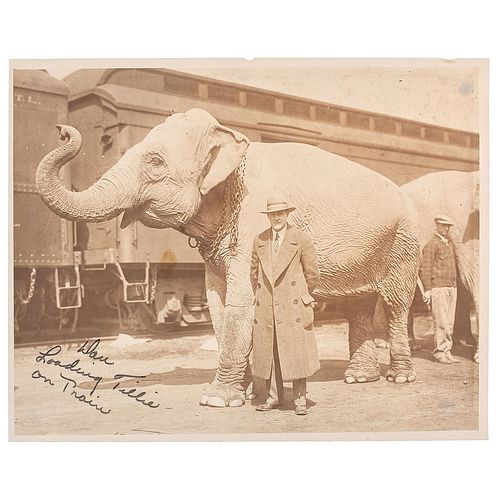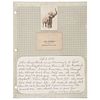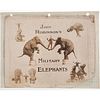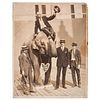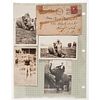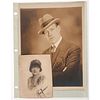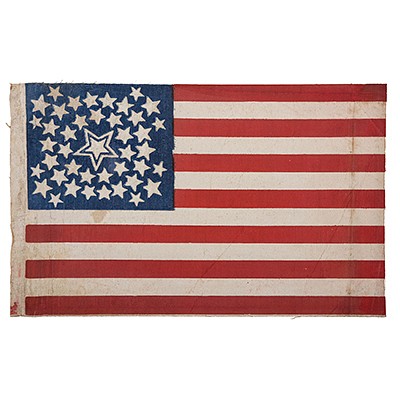Dan Noonan, Circus Elephant Trainer, Photographic and Manuscript Collection
About Seller
6270 Este Ave.
Cincinnati , OH 45232
United States
With offices in Cincinnati, Cleveland and Denver, Cowan’s holds over 40 auctions each year, with annual sales exceeding $16M. We reach buyers around the globe, and take pride in our reputation for integrity, customer service and great results. A full-service house, Cowan’s Auctions specializes in Am...Read more
Two ways to bid:
- Leave a max absentee bid and the platform will bid on your behalf up to your maximum bid during the live auction.
- Bid live during the auction and your bids will be submitted real-time to the auctioneer.
Bid Increments
| Price | Bid Increment |
|---|---|
| $0 | $25 |
| $500 | $50 |
| $1,000 | $100 |
| $2,000 | $250 |
| $5,000 | $500 |
| $10,000 | $1,000 |
| $20,000 | $2,500 |
| $50,000 | $5,000 |
| $100,000 | $10,000 |
About Auction
Nov 19, 2020
Cowan’s Auctions, a Hindman Company, is pleased to present the November 19 Fall Auction, featuring over 400 lots of historically significant photography, manuscript material, artwork, and other ephemera dating from the 18th through the early 20th century, including the Civil War. Cowan's Auctions dawnie@cowans.com
- Lot Description
Archive of Daniel "Curley" Noonan (1884-1933), the elephant trainer and manager of Robinson's Military Elephants. Compiled in 1972 by Helene McNeil Schumer includes 16 large 8 x 10 in. photographs, 40 snapshots, 3 typed letters signed to Noonan, 6 autograph letters signed from Noonan to his wife Rose, 2 telegrams, and 15 newspaper clippings and assorted ephemeral items. Most images depict Noonan with the elephants in both staged promotional photographs and candid snapshots. Organized in a scrapbook, the items come from Noonan via his widow Rose Noonan, whom Schumer describes as her "adopted Aunt Rose." His obituary in the Cincinnati Enquirer notes that Noonan "was a little tike when he joined a road show and began taking care of the pony herd. And he was still a little tike when he was assigned to the 'bulls' - those saying gray hulks that pad around three rings when the show starts, dignified in their oblivion to the crowd." Robinson, quoted in the same article: "'I don't believe Curly was ever away form those elephants 24 hours in 20 years." Noonan began working for Robinson around 1913 or 1914 and spent the rest of his life working with the four elephants: Tillie, Clara, Tony, and Petite (Pit). In a typed letter signed ("J. Augustus Jones") to Noonan on Jones Bros. & Wilson's illustrated letterhead from Muskogee, OK, dated 9 Sept. 1914, Circus owner Jones writes to Noonan, wishing to employ him: "Mr. Wilson told me he thought you could be engaged to handle my Elephants...I wish to get a sober and reliable man who will stay with me and I will treat him right. Dick Jones is now handling my Elephants but I am not satisfied with him as he drinks [too] much whiskey to suit me. My Elephants are nice and gentle. I need a man to finish their Act for Vaudeville." It is clear that his services and temperament were in high demand. John Robinson's Circus, based out of Terrace Park, a suburb of Cincinnati, Ohio, was one of the most popular traveling shows in the United States. The main attraction of the show were the Military Elephants and they were so popular they became an independent act. Of all the elephants, the most famous was Tillie. They would often preform a scene in which Noonan and Tillie would "die" after being wounded in combat. The other elephants would act as medical staff and carry off the wounded soldier. Another would wave an American flag. An image of this scene is captured in an 8 x 10 in. promotional photograph. Tillie was also known to say "Papa" at the climax of the show. Archive includes a typed letter signed ("John G. Robinson") to Noonan on illustrated John Robinson's Military [Elephants] stationary. Atlantic City, NJ, July 12, 1916. Robinson writes to "Curly" with details of the show, with a suggestion for the act: "I think at the wind up of the act it would be good to have Tilly carry an English Flag in her trunk and if you are doing the Battle stuff have the English flag to [throw] over you. It will all help." He also agrees to give Noonan a raise to $40 per week when the act is working, and $25 when they are not. The group was involved with fraternal organizations, especially the Shriners, with several images picturing men in the iconic fez. Also includes a series of 4 snapshots each with an elephant emblazoned with a word, together reading "Syrian Temple Cincinnati Ohio."Noonan would work with the elephants until his death from kidney disease at 44. He is buried in Spring Grove Cemetery in a plot owned by Robinson.Various, several items are affixed to scrapbook pages. Envelopes are present with most letters with splitting at folds. Some chipping, creasing to images.
Condition
- Shipping Info
-
Buyers are required to pay for all packing, shipping and insurance charges. Overseas duty charges are the responsibility of the successful Bidder. Be aware that for larger and/or valuable items, shipping charges can be substantial. - If there is no shipping amount on listed your invoice, you will need to make arrangements to pick up or ship your purchase through an alternative shipping company. Our shipping department can be contacted at 513.871.1670 (ext. 219) or email shipping@cowans.com. - Shipping charges include insurance for your order while in transit. If you have private insurance we will adjust your charge to include only packing and shipping. - Please allow 14 – 21 days after payment to package and ship your purchase as carefully as possible.
-
- Buyer's Premium



 EUR
EUR CAD
CAD AUD
AUD GBP
GBP MXN
MXN HKD
HKD CNY
CNY MYR
MYR SEK
SEK SGD
SGD CHF
CHF THB
THB